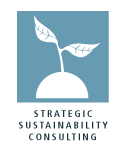You care about the environment, social justice, and human rights. You recycle at home, make sure the lights are switched off at night, and take public transportation whenever possible. You avoid buying products from companies that contract from sweatshops, and even volunteer your time with a charity or two.
But what about at work?
You might not be in a position to dramatically change the direction of your organization, but you can have a positive influence on the environmental and social impact of day-to-day operations. That's where Strategic Sustainability Consulting can help. In this 4-week webinar series, you'll discover how to become a "sustainability champion" in your organization:
-- Learn how to bring your personal values to the office in a positive, energizing way
-- Convince your bosses that corporate social responsibility (CSR) is worthy of their time
-- Determine the most important and strategic areas for an initial CSR program
-- Implement a tracking program that truly measures progress towards sustainability
Each session is a 90-minute interactive webinar, where you'll gain a basic understanding of the topic, hear from an expert in the field, and have an opportunity to ask questions. These webinars are perfect for recent graduates and young professionals�those employees who have the passion, but not the decision-making authority, to tackle the challenges of organizational sustainability and corporate social responsibility.
Week 1: Bringing Your Values to Work
Don't feel frustrated by the disparity between your personal values and your day-to-day workload! Very few of us actually have jobs where we're directly making the world a better place, but that doesn't mean you can't bring a spirit of positive social change to work with you each morning. We'll help you find a balance between your daily to-do list and the larger passions that motivate you to get up each morning.
Guest Speaker: Mary Guarino, Ph.D. is owner of StellarSelf, a personal coaching and wellness consulting practice focused on helping organizations that are dedicated to their employees’ well being, and helping individuals create more balanced, fulfilling lives. Dr. Guarino offers her unique training and experience, which allows her to bring a rich perspective on health and wellness to individuals and organizations. In addition to her coaching training, she holds a doctorate in Applied Developmental Psychology from Fordham University, has conducted research in the areas of psychology and health, and has several years of corporate and entrepreneurial experience.
Dr. Guarino is a member of the American Psychological Association, Association for Psychological Science, International Coach Federation, International Stress Management Association, and Women Presidents’ Educational Organization.
Week 2: Convincing Management That CSR Is Important
Unless you're in the top tier of management, it's unlikely that you can unilaterally introduce policies and programs to improve your organization's social and environmental impact. But by convincing your bosses that corporate social responsibility (CSR) is a good business investment, you can get the support you need to make some real changes. We'll show you how to make the business case for corporate social responsibility to your top management.
Week 3: Building a CSR Program
Once you've gotten management buy-in, the next step is to start developing a corporate social responsibility (CSR) program. In this session, you'll learn how to conduct a "sustainability audit" to determine your organization's key social and environmental impacts, simple ways to start introducing CSR policies and programs, and low-cost strategies to energize your colleagues.
Week 4: Tracking and Communicating Progress
A key part of any successful CSR program (no matter how small) is measuring and communicating your progress. Whether you're measuring pounds of recycled paper or hours of employee volunteerism, having hard data can make the difference between getting additional support (and recognition) and a sputtering enthusiasm. We'll show you how to set up your goals for maximum effect, what metrics to track, and easy ways to create internal and external CSR communications that inspire and energize stakeholders.
Date: Ongoing, check our events page for details
Time: 1 p.m. – 2:30 p.m. EST
Cost: $250
(You can also register for the entire series, or each session individually on the SSC events page.)
Space is limited to 20 people to ensure an interactive experience where you can ask questions and get real answers, so reserve your space today. Once you've signed up, you'll receive an email with log-in and call-in details.
* Ask your company if they will pay for these classes. It's part of your professional development, and by educating you on this important topic they will be helping themselves become more responsible corporate citizens!
.gif)